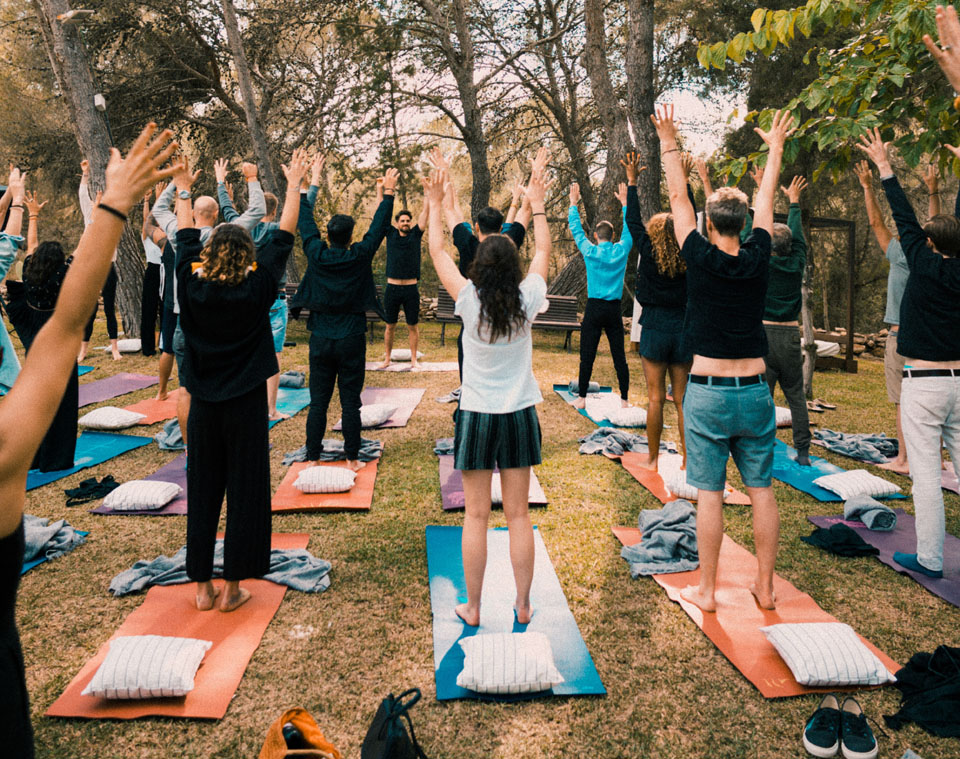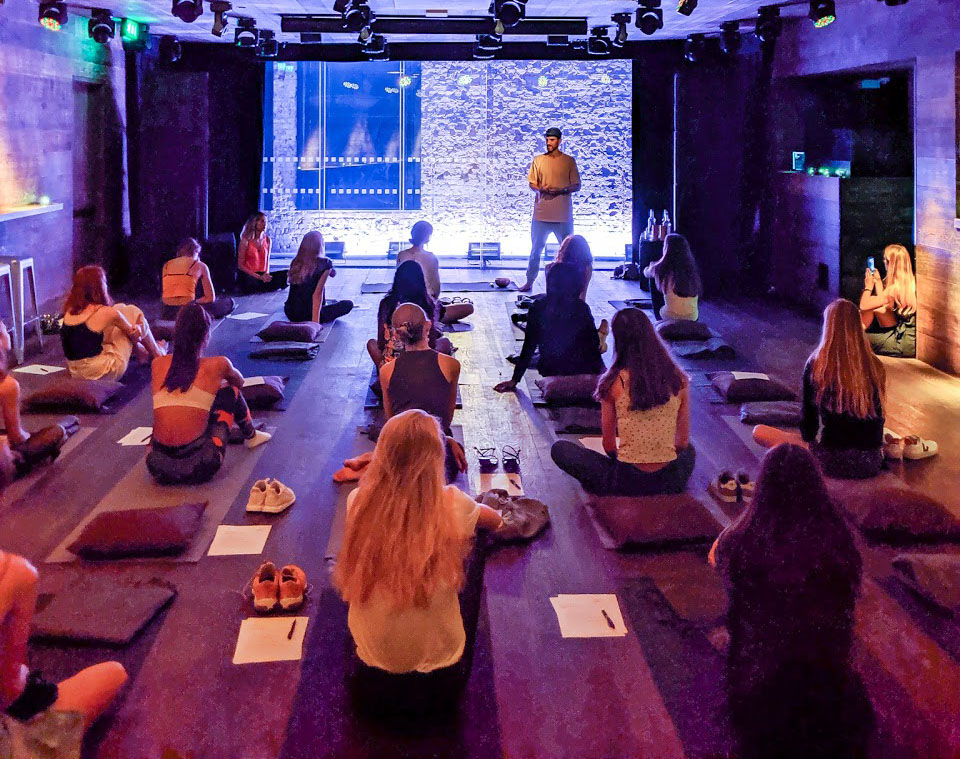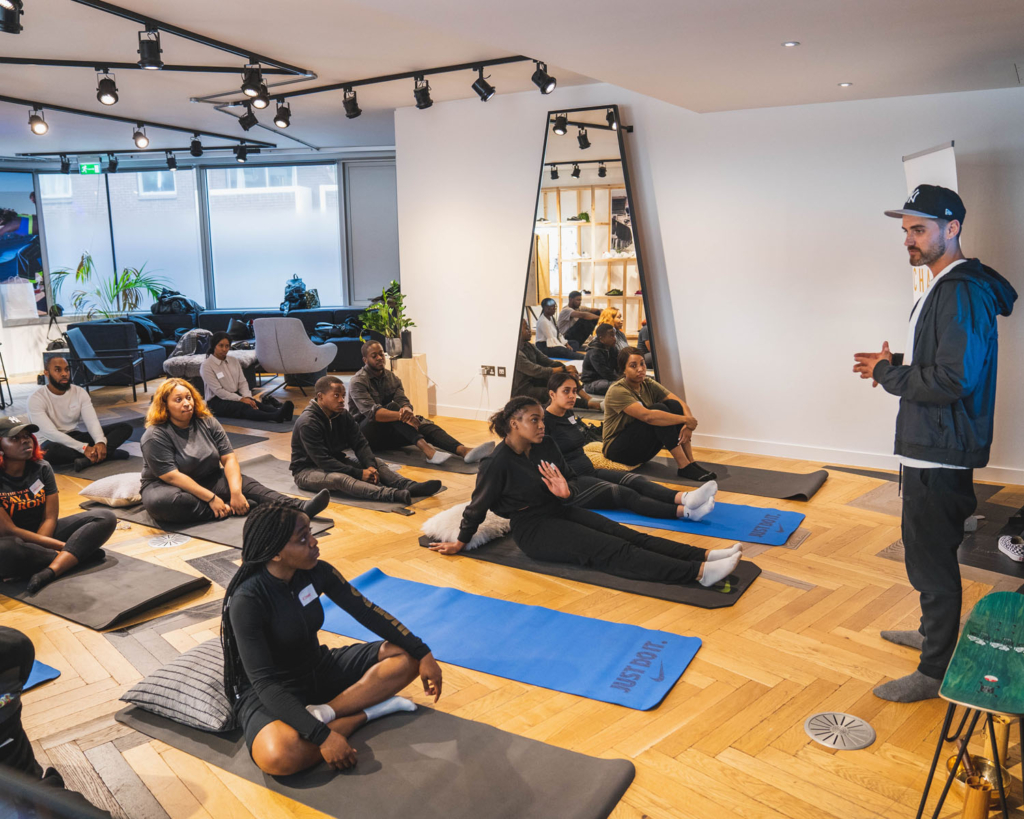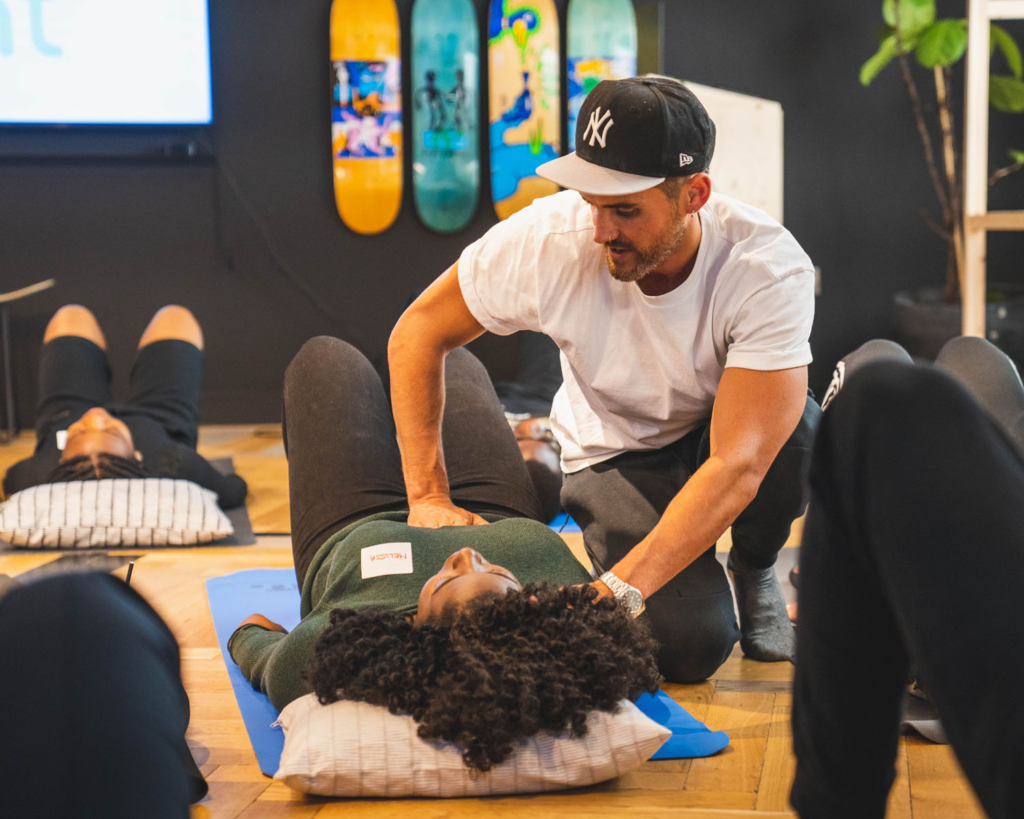The secret to dealing with stress, anxiety, fatigue, depression and frustration, while boosting productivity, confidence, concentration, energy, memory, sleep and emotional intelligence? Take a breath.
That’s right. The answer to many of our most persistent and confounding problems may lie in our very lungs, in an action that we complete thousands of times a day without even sparing a thought. Though, like most things that have immense potential to invoke transformation, it’s not quite as simple as it may sound.
To get to the bottom of how we can better our breathing, we turned to Stuart Sandeman, an expert breath coach who knows a thing or two about managing stress and overcoming trauma. Stuart started out as a judo black belt competing on the Scottish national team, before embarking on a high-powered career in finance and then touring the world as an international DJ, until a deeply personal loss led him to discover the profound healing power of breathwork. Now, as the founder of Breathpod, he dedicates his time and energy to teaching others how to harness this power for themselves.

How you feel and think affects your breathing. But this also works in reverse: By taking control of your breath, you can therefore improve your quality of life.`` – Stuart Sandeman
Here, Stuart shares how understanding and improving our breath can help us cope with the forces that weigh us down, and can ultimately improve our quality of life.
How did you initially discover the power of breathwork? And what made you realise it was your calling to teach others about it?
I came to breathing through grief.
When my girlfriend was diagnosed with terminal cancer, I put all my energy and drive into learning as much as I could about the body, mind and deeper spiritual teachings to try to make sense of what we were going through. A couple months after her passing, I went to a breathwork seminar that was incredibly powerful and deeply healing. It really helped me to deal with my grief, and reconnect to a part of me I had lost. The more I practiced, the more energy I had, and the calmer I felt.
I set out to learn as much as I could about breathwork, and threw myself into various teachings, practices and applications. I couldn’t believe the positive change in my health and wellbeing. Like many people who discover something that really helps them, I wanted to share this with the world.
Your techniques boast a long list of benefits. Could you explain how the simple act of breathing can achieve so much?
The way you breathe affects your physical body, the chemistry of your body, and your mental and emotional state. Basically, how you feel and think affects your breathing. But this also works in reverse: By taking control of your breath, you can therefore improve your quality of life.

Breathing is also directly linked to your autonomic nervous system – your stress (or ‘fight-flight’) response, and your rest response. When you’re in one of those states, your breathing changes. But you can also use your breathing to enter one of these states. So if you need to turn stress into calm, you can use your breath. If you need to turn fatigue to energy, you can do so with your breath. Likewise, you can improve your recovery, sleep and digestion through breathing.
Tension in your natural breathing cycle also mirrors emotional tension in your life. This is because we tend to hold our breath to prevent an emotional outburst. This may be something we are conscious of, like holding our breath to hold back tears at work, or something we do unconsciously, due to our belief systems and how we interact with the world. So by working to reduce and remove that physical tension in your breathing cycle, you can learn to integrate any difficult emotions you might be holding onto from past experiences, and even change old patterns or beliefs that may no longer be helpful.
When it comes to breathing, what are most of us doing wrong? (And how can we fix it?)
It varies hugely. It depends on the challenges you face on a daily basis, and the experiences you’ve had in your life. One common problem I notice is that people are breathing through their mouth and not their nose. This leads to over-breathing, which disturbs your blood pH and can cause a number of health problems. Another issue is chest-dominant breathing. People who do this use the muscles around the chest – the intercostals – rather than the diaphragm – the big, dome-shaped muscle beneath the chest. The mechanics of this mean you are breathing too rapidly and get stuck in a stressful breathing pattern.
Other common problems include having a ‘holding pattern’, which is usually due to having emotional tension, or an irregular pattern, so someone might stop breathing at some times in the day and then make up for it by breathing faster. The quickest, simplest intervention for most people is to close your mouth, breathe through your nose, use your diaphragm, and try to keep your breathing gentle and regular. Of course, the intervention or fix depends on the problem.
We’ll be honest: turning something as fundamental and automatic as breathing into a conscious activity sounds like hard work. How difficult is it to start practicing breathwork?
It isn’t at all! You’re already breathing all the time. You only need to think about it a little bit more. That’s why my first tip is just to be aware. Find out how you are breathing when you are resting, then really try to pay attention to how you breathe throughout the day, and how different experiences change your breathing. Maybe you breathe differently before a difficult conversation or a big meeting. You might notice you breathe very slowly in some situations. Once you understand your patterns, you can use your breath deliberately to change how you feel.
You can also introduce a daily breath practice, which can be as simple as doing four rounds of a particular exercise to regain balance.


These past 22 months or so have been an especially difficult time, with many of us mourning losses, whether it’s a livelihood, a way of life, or a loved one. How can the right breathing techniques help us deal with the trauma of grief and loss, however big or small?
It can be very helpful. We hold our breath and restrict the flow of our breathing when we experience difficult emotions. Our unconscious mind thinks this is the safest thing to do. Because our muscle memory doesn’t have our idea of time, the emotion of that moment can continue to affect our breathing months or years later. We can use our breathing to teach our body that we can let go, and that teaches our brains that we can start to let the emotion go as well. Some ancient traditions also say that grief is held in the lungs. That may or may not be one reason why breathwork is such an effective intervention for grief specifically.
Are there any other wellness habits you swear by for reducing stress and maintaining overall health and wellbeing?
Exercise! I love to get moving. You can walk, run, swim or even dance around your room. The key thing is to get your heart rate up and be active. It’s great for your mental and physical health, too.
I think eating healthily is also a must. You need to give your body the right fuel to make sure it runs efficiently. And something I’m really getting into right now is cold water swimming. Cold water teaches you how to deal with your stress response. And you don’t have to go wild swimming to start experiencing this. A cold shower can be just as effective.


You’ve worked with people all across the world, teaching them how to improve their mental and physical health through breath. Can you share any particularly memorable stories from your workshops and sessions?
To quote Fight Club: What happens in a Breathpod workshop stays in a Breathpod workshop! Okay, I’ve tweaked that a little bit. But we really value confidentiality. People are coming in with all sorts of challenges, and it’s so important for us that we protect their privacy.
The experiences people have vary, but they’re usually positive and often profound. This makes my work really rewarding. I’ve had big brands and creative teams come up with killer ideas, stressed-out city workers find calm. There are people who’ve gone from the brink of despair to having real optimism about their future. I’ve seen insomniacs get a good night’s sleep, and athletes of all levels – from amateurs trying to beat their PB to Olympic athletes – find an edge. I also have received countless inspiring messages from people who have joined my daily Instagram sessions, or listened to my Decompression Session show on BBC Radio 1, who say they have been able to access a deep focused state, improve their breathing function after Covid, or find a new sense of peace and happiness. That’s all down to breathing.
Can you recommend any easy, stress-relieving breathing exercises that readers could start practicing immediately?
I can’t tell you how many times this has kept me calm at a difficult moment: If in doubt, breathe it out! This is super easy. You breathe in for four through your nose, hold for four at the top, and then breathe out your mouth for eight. This activates your rest response, slowing your thoughts, letting tension drain from your muscles, and slowing your heart rate. It’s a great one to do when you’re stressed or nervous, or if you are struggling to sleep.

What’s the best way to get involved with Breathpod and take part in your workshops and breathing sessions?
I host regular Breathpod events, workshops and sessions in person and online. I often work with business teams to teach the power of breathwork in the workplace. I have been pretty active with live sessions on my Instagram, too. It’s been great to see the Breathpod community grow, to hear individual stories, and to connect with people far and wide.
Of course there is also my Decompression Session show on BBC Radio 1. It’s a weekly show available on demand on BBC Sounds, where I share advice on a range of topics to help you manage your mindset, and play chilled tunes to lift your vibe.
The best way to find out what’s coming up is to sign up to our newsletter at breathpod.me, or check out our Instagram.














Sorry, the comment form is closed at this time.